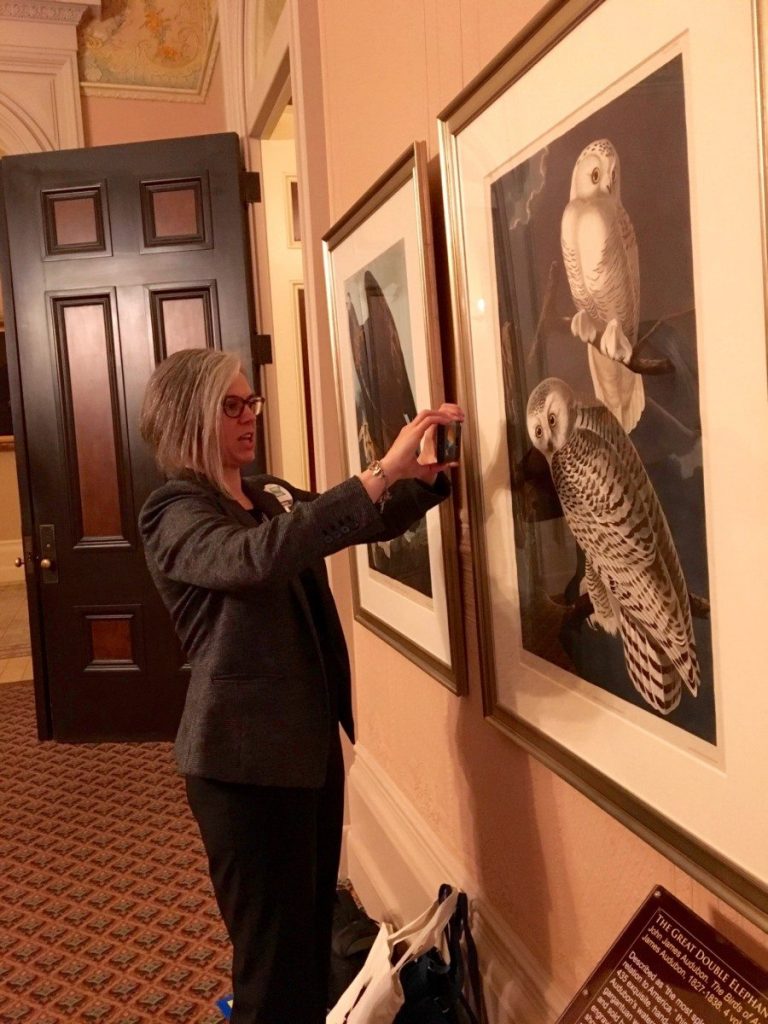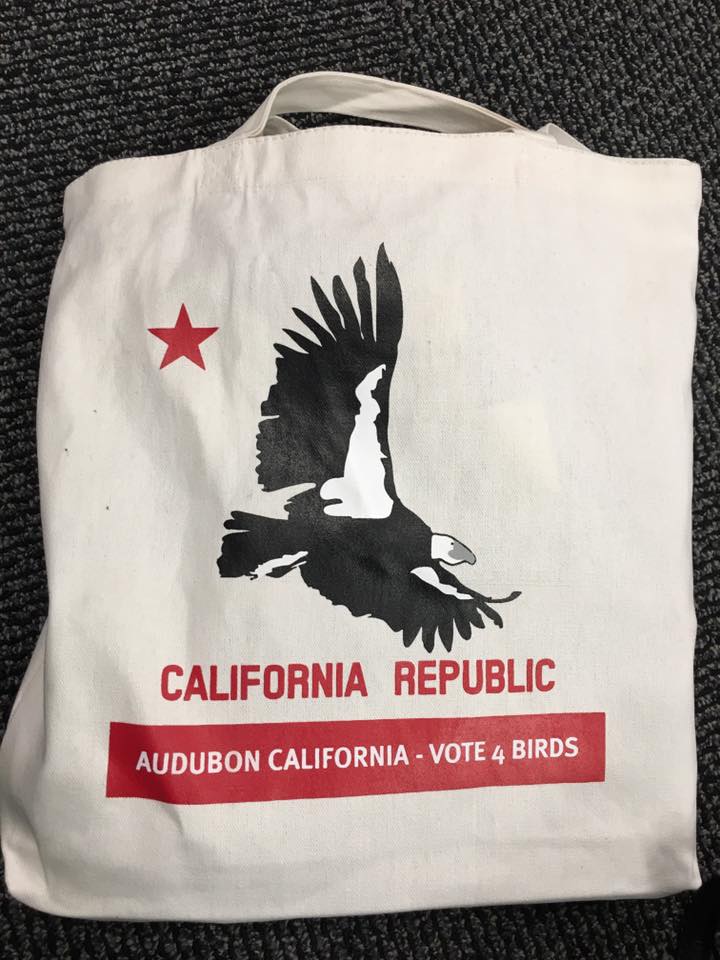From bird lover to bird lobbyist (for a day)
By Janet McGarry
Like most nature lovers, I am alarmed and outraged at Trump’s efforts to dismantle environmental regulations and policies. So when I read on Golden Gate Bird Alliance’s Facebook page about Audubon California’s Advocacy Day on June 8th, it seemed like the perfect opportunity to take action rather than despair and rage. Spending a day in Sacramento would be a small sacrifice in light of how much I love birdwatching and enjoy Audubon classes, walks, and lectures. I had traveled much further to attend the climate change conferences in Copenhagen and Cancun; a trip to Sacramento would be easy in comparison.
I was a bit nervous at the prospect of speaking to politicians, so was relieved when Audubon California invited me to participate in two conference calls to prepare for Advocacy Day. During the calls, Policy Director Mike Lynes provided background about the bills and advice about how to best communicate with legislators. Although they meet with many professional lobbyists, lawmakers are particularly interested in hearing about issues that impact their constituents. He encouraged us to speak about out personal experiences with birds in addition to the proposed legislation. He also reassured us that an Audubon employee knowledgeable about the bills would accompany each group of advocates.
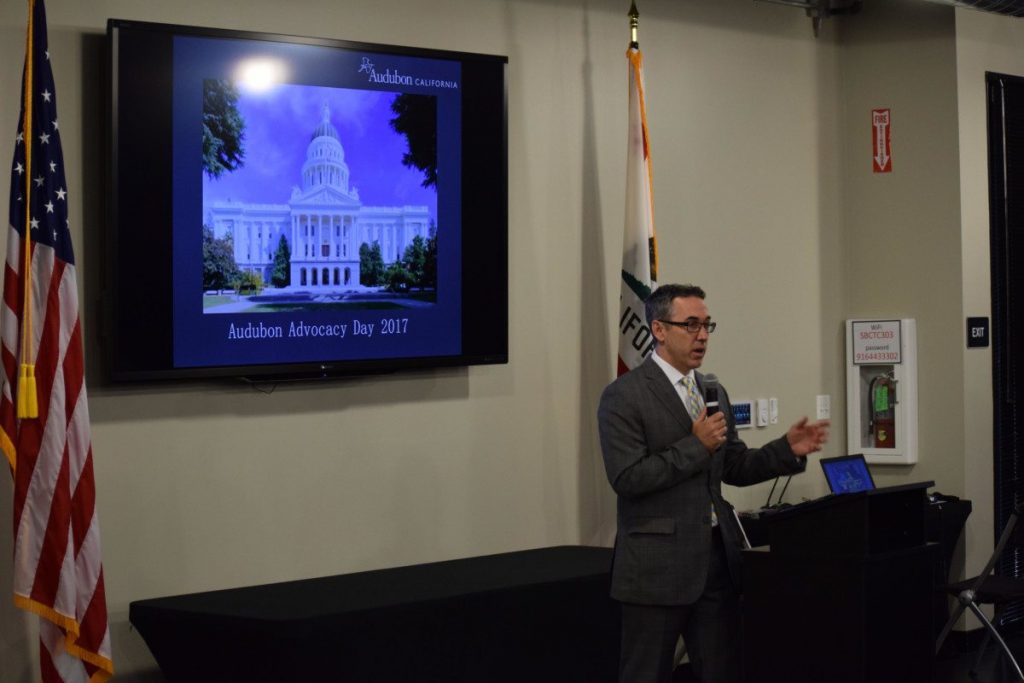
In addition to these training calls, Audubon staff scheduled meetings with legislators, helped coordinate carpooling, and provided links to web sites with information about legislators’ voting records. Some quick Internet research allayed any remaining anxiety: My representatives strongly supported environmental laws, so I anticipated “preaching to the choir” on Advocacy Day.
For our 2017 visits, Audubon focused on four areas that directly pertain to birds:
- Protecting California’s natural resources.
- Wildlife funding.
- Funding and support for the Salton Sea.
- Climate.
“Preserve California” Bills
Three of the bills we were supporting — Senate Bills (SB) 49, 50 and 51, collectively called the “Preserve California” package – will provide protection under California law if Trump’s administration weakens federal environmental laws and policies. SB 49 establishes baseline protection for water and air quality and endangered species so that California will continue to have environmental standards at least as strong as the federal laws that were in place on January 1, 2017.
SB 40 would give California the right of first refusal to purchase any federal land that the U.S. government tries to sell in the state. Almost 45 percent of California, over 45 million acres of land, is owned by the federal government. Finally, SB 51 would provide protection for whistleblowers and scientific data to ensure the integrity of scientific information used for policymaking.
Salton Sea protection
A key issue for Audubon is the environmental and public health crisis at the Salton Sea, a crucial Southern California site on the Pacific Flyway used by more than 400 species of birds. Due to water transfers, the sea is shrinking and dust from the seabed has become a major point source of air pollution; 25 percent of the 650,000 who live near the sea suffer from asthma. We asked lawmakers to support SB 615, which would develop a long-range management plan for the Salton Sea, create a timeline of projects, and identify funding sources.
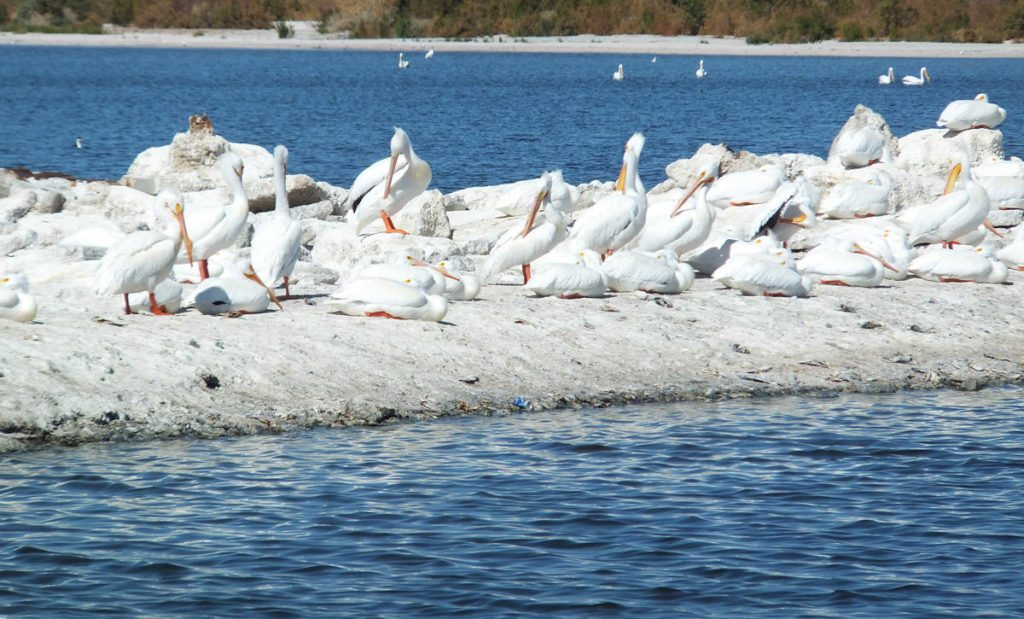
Climate change leadership
Another priority was urging legislators to continue to play a leadership role in the U.S. on climate change policy. Audubon researchers have identified 170 bird species that are likely to see either significant reductions in their populations and ranges or increased risk of extinction due to climate change. We asked them to extend California’s existing cap-and-trade program and invest in natural and working lands like forests, farms and wetlands.
(Gratifyingly, on July 25 Gov. Jerry Brown signed legislation extending cap-and-trade until 2030, cementing the state’s leadership on climate and turning the five-year-old program into a more permanent fixture of California’s environmental agenda.)
Wildlife protection
We also asked legislators to support two bills that would fund wildlife protection. Assembly Bill (AB) 18 provides $3 billion for parks and natural resource management, and SB 5 provides $3.5 billion in bonds for parks and water projects.
Finally, Audubon wants additional regulation of off-road vehicles and environmental reviews of development projects. AB 890 would reform the California Environmental Quality Act (CEQA) to require environmental review of development projects proposed through a ballot initiative. SB 249 would require the California Department of Parks and Recreation to improve monitoring of the environmental impacts from off-road vehicles, and to consider protection of natural resources when new off-road vehicle facilities are proposed.
Early birds hit the road
In the early morning of June 8 (as early as going on a birding trip!), I picked up Denise Louie and Nancy Szymanski, two other GGBA members, and drove to Sacramento. In the capital, we met with almost 80 other members of Audubon chapters from around the state for one last cram session over breakfast.
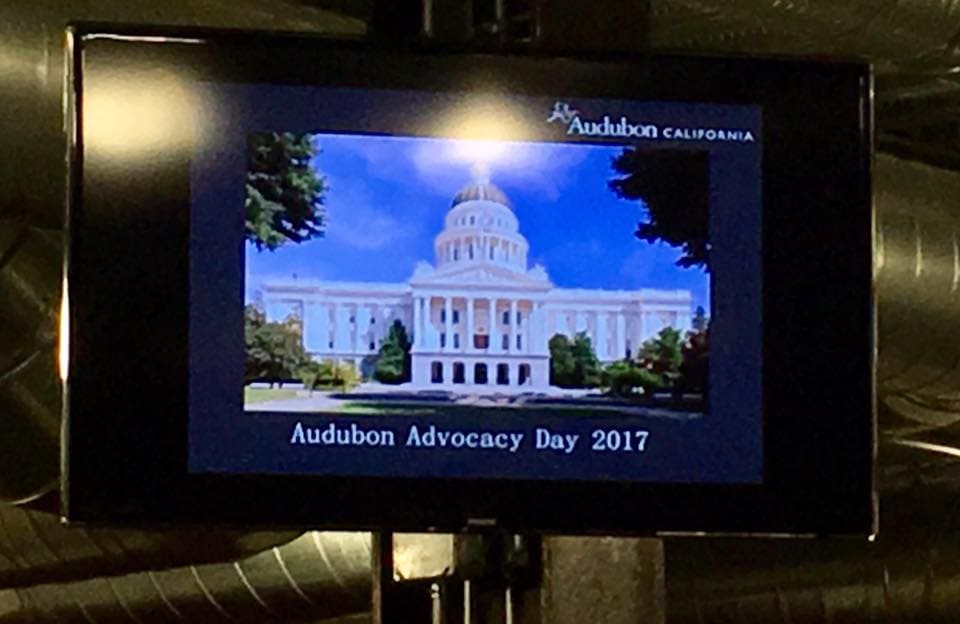
We learned of recent changes to bills and received our schedule of meetings with the legislative staffs of Senators Scott Wiener and Jerry Hill and Assemblymen David Chiu and Phil Ting. I wasn’t surprised that we would speak to staff members because we had learned during the conference calls that they often are better informed about issues and remain in their positions longer than their elected bosses.
Janine Kraus, Audubon California’s development director, joined our group representing San Francisco and explained that she would provide background information about Audubon and help us with answering questions about the proposed bills. After dividing up the work, with each of us responsible for talking about different bills, we headed over to the Capitol.
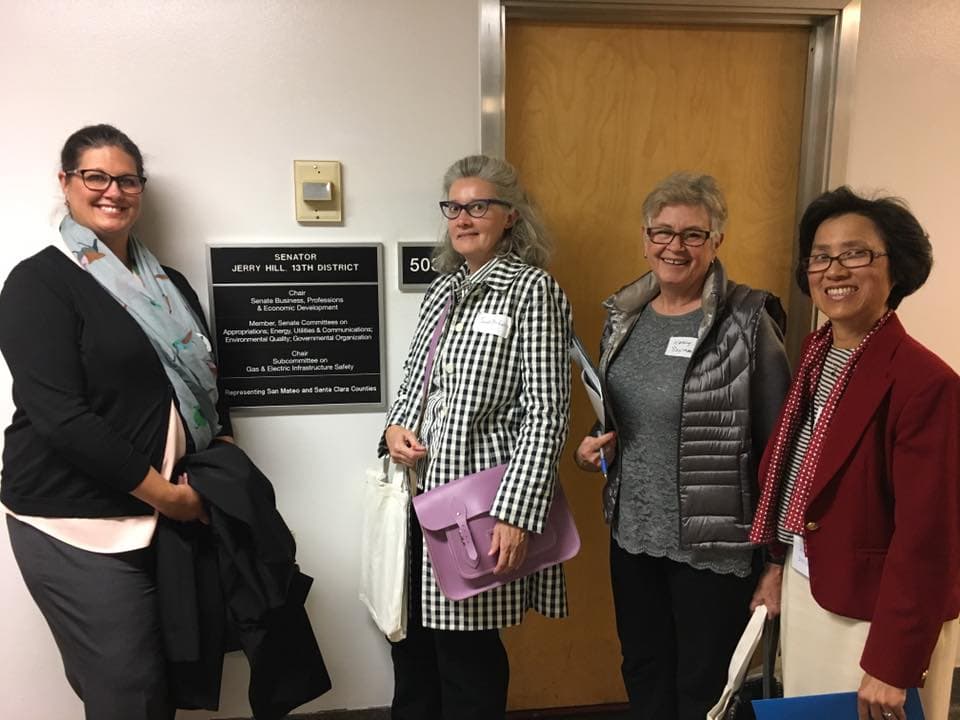
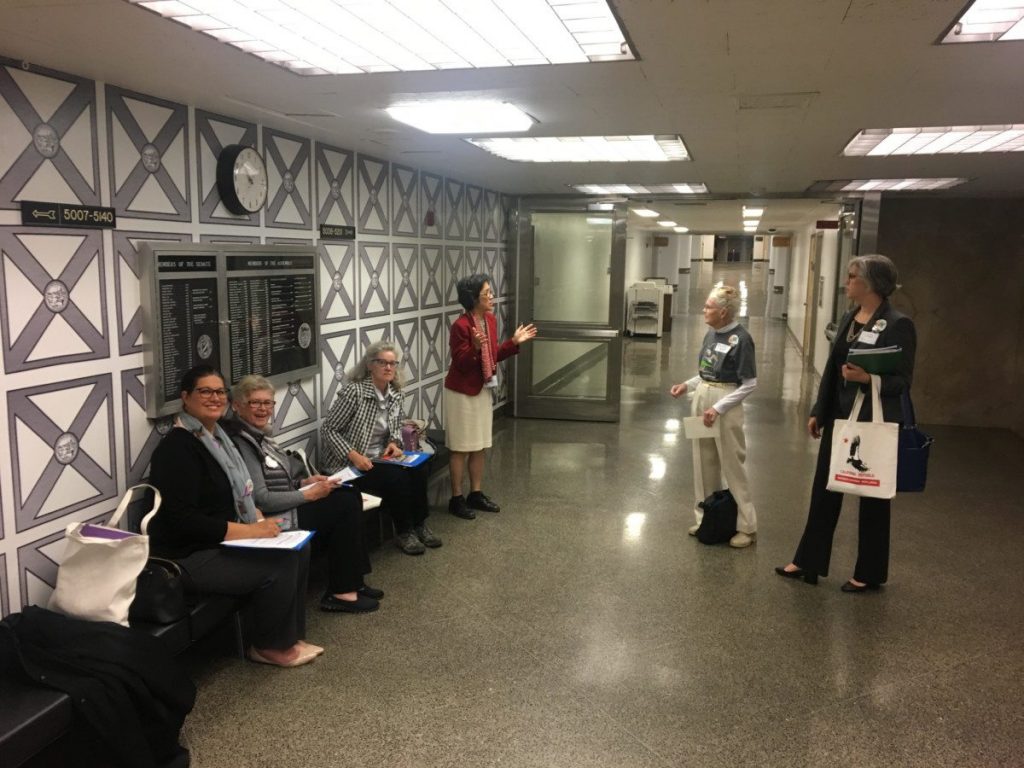
Our first meeting was scheduled with Senator Wiener’s legislative director but he was out sick so instead we met with legislative aide Miles Horton. When Miles told us that he had worked for the Sierra Club before joining Weiner’s office, I felt that we had lucked out by starting the day with such a receptive audience. During our discussion, I mentioned climate change’s potential negative impact on Yellow-billed Magpies — one of California’s few endemic birds that I had recently seen birding — and Miles was intrigued. Clearly, the suggestion to include personal stories was good advice.
Constructive and informative meetings
Our next two meetings with the legislative directors for Senator Jerry Hill and Assemblymember David Chiu were both constructive and informative. I was impressed by how knowledgeable both aides were about environmental issues, and our discussion gave me insight into the difficulties of the legislative process. I was particularly interested in their explanation of the challenges associated with the idea of a carbon tax that would pay dividends back to citizens. For example, what percentage of the dividends would be returned to citizens, and how would the government distribute these dividends?
After three meetings, we broke for lunch with members of other Audubon groups from around California. I chatted with a man from Stanislaus County about environmental issues in the Central Valley and with two people who had flown up from Los Angeles, one of whom delighted in making bird puns.
After lunch, our last meeting was with a legislative aide for Phil Ting, my own assemblyman. Like all of the other legislative staff we met, she told us that her boss was very supportive of environmental laws; in fact, he drives an electric car.
Advocacy = empowerment
I’m so glad that I participated in Advocacy Day and plan to participate again in 2018. It felt empowering to advocate for wildlife and healthy ecosystems and fight against Trump’s efforts to dismantle federal environmental laws. Did I persuade legislators to vote for a bill? Probably not, because they already were going to support the bills. However, our visit reminded politicians that their constituents are extremely concerned about environmental issues, and may encourage them to treat these issues as a top priority.
I hope that more people from GGBA make the trip to Sacramento next year. Unless we adopt laws and policies to protect our precious natural resources, the beautiful, intriguing birds we love to study and observe will vanish from the skies.
You can help even if you didn’t attend Advocacy Day! Two of the bills that Janet and other Audubon members were promoting — SB 49 and SB 249 — have passed the Senate and now need approval by the Assembly. These both have significant opposition, so legislators need to hear from supporters in their districts. Please email or call your Assembly member and ask them to vote yes on SB 49, which would establish baseline environmental protections on the state level in case Trump rolls back federal regulations, and SB 249, which would require the state Department of Parks to consider protection of natural resources when new off-road vehicle facilities are proposed.
Janet McGarry has been watching birds for only a few years but has been interested in nature and environmental issues for many years. She lives in San Francisco, where she teaches and writes.
